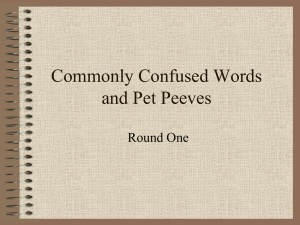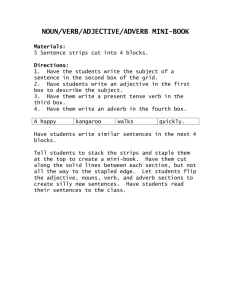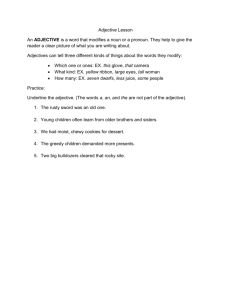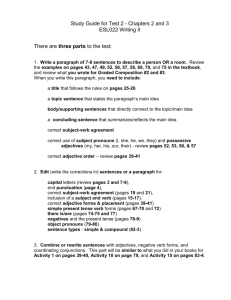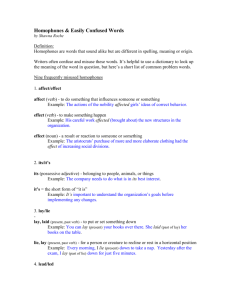Commonly Confused Words and Pet Peeves
advertisement
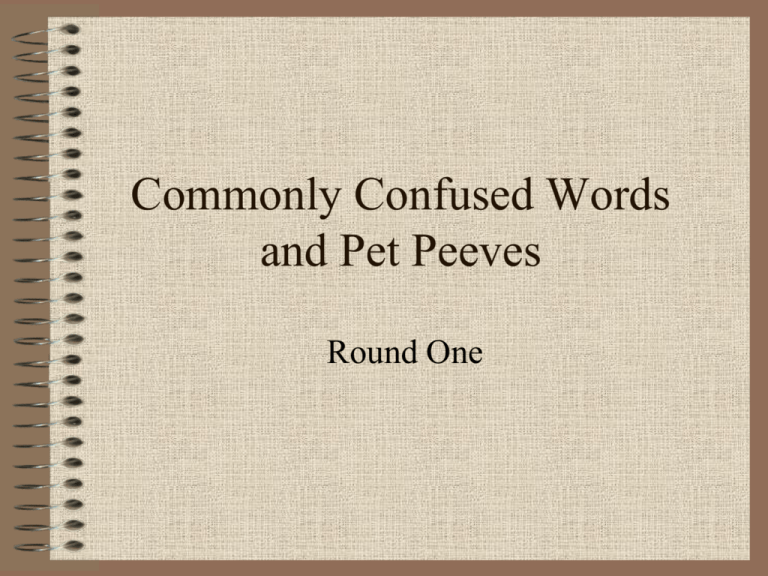
Commonly Confused Words and Pet Peeves Round One You’re/Your Copy the sentences below, using the correct word. 1. (You’re/Your) not the only one that did not get picked. 2. Please do not take (you’re/your) time getting here. Cite vs. Site • The word cite is a verb that means to mention or quote as an authority or example. • The word site means a particular place. All ready vs. Already The words all ready mean “all prepared” We were all ready to leave. The word already means “previously” We have already painted the sets. Passed vs. Past The word passed means “went by, beyond, over, or through.” He passed the last car before reaching the checkered flag. The word past means “time gone by,” “of a former time,” or “beyond.” He told stories about the past. He has missed the past two days. He walked right past the snake. Adverse vs. Averse • Adverse means “unfavorable.” – That could have an adverse effect on your health. • Averse means “opposed” or “reluctant,” and is usually followed by “to.” – I am very averse to any vacation that poses a threat to my safety. Anxious vs. Eager • Anxious means “apprehensive,” or nervous, about something; although, you might have an excitement for it as well. I am very anxious about the championship game. • Eager means you await something with pleasant expectations. I am so eager for summer vacation! Assure, ensure, insure • Assure is a verb meaning “to make certain by removing doubt or suspense; to promise.” I assure you that will not happen again! • Ensure is a verb meaning “to make certain by protecting; to guarantee.” The First Amendment ensures the freedom of speech. • Insure is a verb meaning “to arrange for monetary payment in case of loss, etc.” What is the cost to insure both vehicles? Peak vs. pique (as verbs) • The verb peak means to “achieve a maximum or to bring to a maximum.” – The popularity of the show Cheers peaked in the late 1980s. • The verb pique means “to provoke or arouse,” or “to provoke resentment or indignation.” – Which sport piques your interest the most: hockey or football? Coarse vs. Course The word coarse is an adjective meaning “rough” or “crude” I scraped my arm on the coarse cement. My skin is coarse during the winter months. Coarse vs. Course (cont.) The word course is a noun meaning “part of a meal,” “a series of studies,” “a playing field,” or a “path of action.” It is a four course meal. The speech course made me nervous. The golf course was difficult to play. You are on a good course in life. Then / Than Copy the following sentences, using the correct form of (then / than). 9. I can’t believe I’m older (then/than) you. 10. I will take my time, (then/than) I’ll go to class. 11. My shoes are much cleaner (then/than) yours. Affect vs. Effect • Affect is a verb meaning “to influence.” Try not to let unkind remarks affect you. • Effect is usually used as a noun that means “the result of.” The effects of the hurricane were evident. Everyday vs. Every day • Everyday is an adjective. Her everyday clothes made the rich kids scoff. • Every day is an adverb telling “when” or “how often.” Every day, he comes into the classroom ten minutes late. Complement vs. Compliment • The word complement is a noun and a verb. In either case, it refers to something that completes or goes well with something else. – The sauce is a nice complement to the vegetables. – The sauces complements the vegetables. • The word compliment is also a noun and a verb, but it indicates the offering of praise or flattery to another person. – He gave her a compliment about how she was dressed. – He complimented her on her attire. Desert vs. Dessert The word desert means “a dry region” or “to leave or abandon.” He crossed the desert at night. She deserted her sister at Kennywood. The word dessert means “the final, sweet course of a meal.” The buffet’s food was great, except for the dessert, which was dry and bland. They’re / Their / There Copy the sentences below, using the correct word. 1.(They’re / Their / There) house was destroyed by the hurricane. 2.Put the television over (they’re / their / there). 3.(They’re / Their /There) not the ones who stole the candy. Continual vs. Continuous • The word continual means “repeated regularly and frequently.” – The continual interruptions became tedious. • The word continuous means “extended or prolonged without interruption.” – The broken siren made a continuous wail. To / too / two Copy the following sentences with the correct form of (to/too/two). 1.You have (to/too/two) minutes to get to class. 2.We’re going (to/too/two) the movies. 3.There are way (to/too/two) many warmups in this class. Weather vs. Whether The word weather refers to “conditions outdoors.” The weather has been far from perfect this week! The word whether indicates an alternative or some doubt. You must decide whether you want to go or not. All together vs. Altogether • All together is an adverb meaning “in unison,” or an adjective meaning “ in the same place. Please sing all together, now. We were all together for the holidays. • Altogether is an adverb that means “entirely.” Her reaction was altogether unexpected. Principal vs. Principle The word principal means “the head of a school,” or “main or most important.” Mr. Stephens is the principal. The principal export of Brazil is coffee. The word principle means “a rule of conduct,” or “a fact of general truth.” Her principles are very high. MLK supported a principle of non-violence. Accept vs. Except • Accept is a verb meaning “to receive.” Did you accept the gift? • Except is a preposition that means“excluding.” We were busy every night except Tuesday. Formally vs. Formerly The word formally means “in a proper or dignified manner,” or “according to strict rules.” Did you dress formally for the party or wear everyday clothing? The word formerly means “previously,” or “done in the past.” The lake was formerly a valley. Lose / Loose Your / You’re Copy the following sentences with the correct form of (lose/loose) and (your/you’re). 12. His pants were (lose/loose) fitting. 13. Take (your/you’re) feet off the desk. 14. We hope we don’t (lose/loose) today. 15. (Your/You’re) not the first person to say that. Personal vs. Personnel The word personal is an adjective meaning “individual” or “private.” The store manager gave us personal attention. The word personnel refers to “a group of people employed in the same work.” Management asked personnel to come to work 10 minutes earlier than last year. Waist vs. Waste The word waist means “the midsection of the body.” The pants are too tight around the waist. The word waste means “a needless expense,” “unused material,” or “to use foolishly.” Waiting in line is a waste of time. Do not waste too much time on video games. Its / It’s Copy the following sentences with the correct form of (its / it’s). 5. (Its / It’s) been so long since I’ve seen you. 6. I can’t believe (its / it’s) finally Friday! 7. The dog managed to get (its / it’s) legs stuck in (its / it’s) doghouse. 8. (Its / It’s) just a matter of time before a snake bites (its / it’s) owner. Through / Threw Copy the following sentences, using the correct form of (through/threw): 1.We had to go (through/threw) the metal detectors. 2.The president (through/threw) out the first pitch at the game. 3.He (through/threw) up after getting off the roller coaster. Who’s / Whose Copy the sentences, using the correct form of (who’s / whose). 1. (Who’s / whose) book is this? 2. (Who’s / whose) coming to the football game tomorrow? 3. The man (who’s / whose) house collapsed is now homeless. 4. I need to know (who’s /whose) with me. Quiet vs. Quite The word quiet means “silent” or “still.” The library is now usually quiet. The word quite means “completely, rather, or very.” He was quite sure he was at school yesterday. Between vs. Among • Between usually works with choosing between two. Between being late for work and not having eaten, I had a horrible morning. Put the speakers between the TV and the fireplace. Between vs. Among (cont.) Among is usually required for three or more. Among all who were in the crowd that day, he is the primary suspect. We were asked to choose a puppy among the entire litter. Everyone vs. Every one • Everyone is a pronoun, which should be used only when you can substitute everybody. Everyone who answers the questionnaire will win a prize! • Every one is a phrase made up of the adjective every and the pronoun one. Every one of the players was angry with his captain. After the game every one of the players went to the coach and complained. In, Into, and In to • In means “within.” If you are walking in a room, you move around inside of it. • Into means “from the outside to the inside.” If you walk into a room, heads might turn as you enter. • In to is two words: I turned my paper in to my teacher. Don’t give in to temptation. Disinterested vs. Uninterested • The word disinterested means “impartial.” – Let a disinterested person judge the dispute. (an impartial person) • The word uninterested means “not interested in.” – The man is uninterested in our dispute. (not interested) Elicit vs. Illicit • The verb elicit means “to bring out” or “to evoke.” – The teacher tried to elicit a response from the students. • The adjective illicit means “unlawful.” – The illicit material was confiscated immediately. May versus Might • Both usually point to the future, but may carries a more positive connotation than might. May shows better odds, too. We think we may play as early as Friday, but we might have to wait until Wednesday. Lay vs. Lie • Lay is a verb that means “to put [something] in its place.” The past tense is laid. Lay the napkins on the table, if they’ve not already been laid. Lay vs. Lie (cont.) • Lie means “to rest, “to recline,” or “to be in a certain place.” It does not take a direct object. I might go lie down. I’m not feeling well. The present participle is lying. I left the napkin lying on the table. One problem is that lay is the past tense of lie. The seed lay on the ground. Lain is the past participle of lie. The seed had lain on the ground without watering, so it died.
